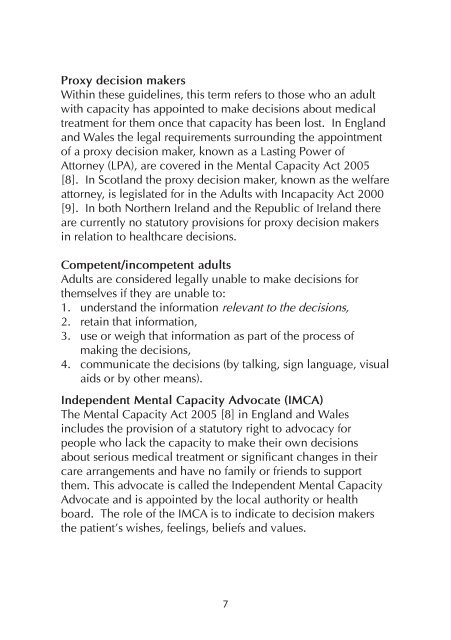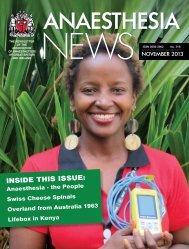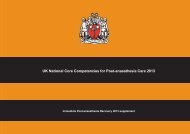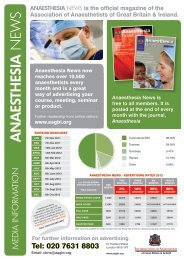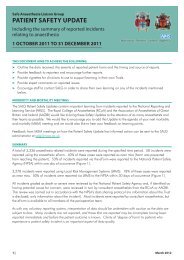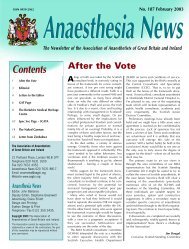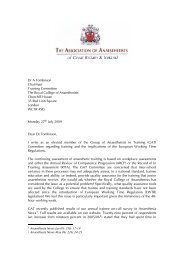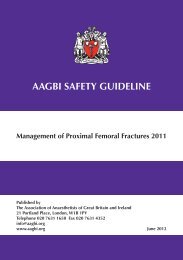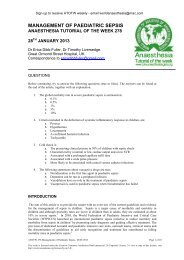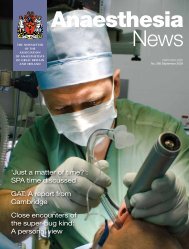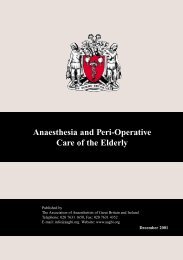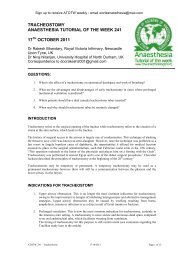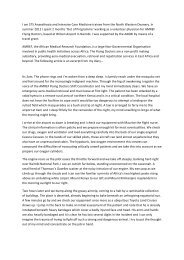Do Not Attempt Resuscitation (DNAR) Decisions in the ... - aagbi
Do Not Attempt Resuscitation (DNAR) Decisions in the ... - aagbi
Do Not Attempt Resuscitation (DNAR) Decisions in the ... - aagbi
You also want an ePaper? Increase the reach of your titles
YUMPU automatically turns print PDFs into web optimized ePapers that Google loves.
Proxy decision makers<br />
With<strong>in</strong> <strong>the</strong>se guidel<strong>in</strong>es, this term refers to those who an adult<br />
with capacity has appo<strong>in</strong>ted to make decisions about medical<br />
treatment for <strong>the</strong>m once that capacity has been lost. In England<br />
and Wales <strong>the</strong> legal requirements surround<strong>in</strong>g <strong>the</strong> appo<strong>in</strong>tment<br />
of a proxy decision maker, known as a Last<strong>in</strong>g Power of<br />
Attorney (LPA), are covered <strong>in</strong> <strong>the</strong> Mental Capacity Act 2005<br />
[8]. In Scotland <strong>the</strong> proxy decision maker, known as <strong>the</strong> welfare<br />
attorney, is legislated for <strong>in</strong> <strong>the</strong> Adults with Incapacity Act 2000<br />
[9]. In both Nor<strong>the</strong>rn Ireland and <strong>the</strong> Republic of Ireland <strong>the</strong>re<br />
are currently no statutory provisions for proxy decision makers<br />
<strong>in</strong> relation to healthcare decisions.<br />
Competent/<strong>in</strong>competent adults<br />
Adults are considered legally unable to make decisions for<br />
<strong>the</strong>mselves if <strong>the</strong>y are unable to:<br />
1. understand <strong>the</strong> <strong>in</strong>formation relevant to <strong>the</strong> decisions,<br />
2. reta<strong>in</strong> that <strong>in</strong>formation,<br />
3. use or weigh that <strong>in</strong>formation as part of <strong>the</strong> process of<br />
mak<strong>in</strong>g <strong>the</strong> decisions,<br />
4. communicate <strong>the</strong> decisions (by talk<strong>in</strong>g, sign language, visual<br />
aids or by o<strong>the</strong>r means).<br />
Independent Mental Capacity Advocate (IMCA)<br />
The Mental Capacity Act 2005 [8] <strong>in</strong> England and Wales<br />
<strong>in</strong>cludes <strong>the</strong> provision of a statutory right to advocacy for<br />
people who lack <strong>the</strong> capacity to make <strong>the</strong>ir own decisions<br />
about serious medical treatment or significant changes <strong>in</strong> <strong>the</strong>ir<br />
care arrangements and have no family or friends to support<br />
<strong>the</strong>m. This advocate is called <strong>the</strong> Independent Mental Capacity<br />
Advocate and is appo<strong>in</strong>ted by <strong>the</strong> local authority or health<br />
board. The role of <strong>the</strong> IMCA is to <strong>in</strong>dicate to decision makers<br />
<strong>the</strong> patient’s wishes, feel<strong>in</strong>gs, beliefs and values.<br />
7


